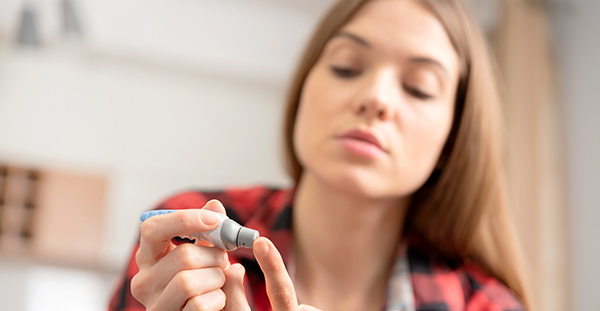Hypoglycemia: what it is and causes?

Hypoglycemia is a drop in sugar level in the blood that manifests itself with symptoms such as general malaise, dizziness, tremor, cold sweat. It can happen to anyone. Still, it is more common in people with diabetes.
What is hypoglycemia?
Hypoglycemia is a disease state consisting of abnormally low blood sugar, abnormal considered a concentration below 60-70 mg/dl blood. This decrease can occur due to three circumstances:
- The body uses up glucose in the blood too quickly.
- Glucose is released into the bloodstream too slowly.
- Excess insulin is released into the bloodstream.
This is a relatively common disorder in people with diabetes. Diabetes is a disease that is the opposite situation to hypoglycemia. i.e., people with diabetes have too high a concentration of glucose in the blood due to a deficiency in insulin production by the pancreas (Type I diabetes or juvenile diabetes) or an inadequate response to it by the body (type II diabetes).
The treatment of this disease is based on the administration of insulin or drugs that facilitate glucose uptake by the cells. However, a diabetic individual may experience a hypoglycemic episode if:
- Take too high a dose of insulin or any of your diabetes medications.
- You do not respect the treatment schedule with insulin or other antidiabetic treatments.
- They do not eat enough food. They do not have glucose available in the body, neither to be stored nor to be consumed.
- Perform a sudden physical exercise that requires a greater energy intake than your body has.
Neonatal babies born to diabetic mothers often have very low blood sugar levels at birth.
Hypoglycemia: Sugar and Insulin
Sugars have a mainly energetic role in the body. They are essential for the muscles, brain, and other organs and tissues to carry out their normal activity. Glucose is the main sugar used by our body’s cells to obtain this energy, and the main source of glucose is food, specifically carbohydrates (the body also makes specific amounts of glucose from other compounds).
So one of the objectives of diet is to maintain blood glucose levels adequate to our organs and tissues’ requirements. When we eat, for example, a plate of pasta, it will be broken down into smaller and smaller compounds, which can finally be absorbed in the intestine. One of these compounds is glucose. After its absorption in the intestine, and before passing into the general circulation, this sugar will be transported to the liver, where a part will be stored in the form of glycogen (a compound formed by several glucose chains). The glucose that has not been stored will leave the liver and be transported by the blood to nourish all the body cells.
At any given moment, the level of sugar in the blood can decrease, either because we have not eaten for a long time or because we have made an effort that required that energy. Suppose we do not eat food that provides the necessary glucose to cover this lack. In that case, the liver will begin to degrade glycogen, and the glucose obtained from this process will pass into the blood and again reach the concentration necessary to feed our tissues. Arguably, the liver reserve is a fairly efficient safety system.
In addition to the liver, the human body has another store of glucose, the muscles. Unlike the reserve formed in the liver, the muscle reserve is in principle exclusively for this tissue.
Insulin
For the sugar found in the blood to be used by the body, the body must secrete insulin, which is a hormone synthesized in the pancreas, which allows the cells to take up the glucose found in the blood. This hormone is released when there is an increase in glucose level in the blood, that is, after eating. There is also a tiny amount that is released more regularly during periods of fasting.
Risk factors for hypoglycemia
People with certain endocrine disorders are susceptible to hypoglycemic episodes. The following are risk factors for hypoglycemia :
- Hypopituitarism: abnormally low production of hormones secreted by the pituitary. The pituitary gland, or pituitary gland, controls many other secretory glands’ activity so that its alteration causes disorders at various points in metabolism.
- Hypothyroidism: deficit in the activity of the thyroid gland. Hypothyroidism can be caused by a failure in the pituitary, responsible for regulating its activity, or failure in the thyroid gland itself. The main hormone secreted by this gland is thyroxine, which is necessary to keep the basal metabolic rate (resting metabolic rate) within proper levels.
- Hypoadrenalism: decreased activity of the adrenal gland. Adrenaline is a hormone that, at certain times, is responsible, among other things, increase glucose levels in the blood by its action on the liver and muscles; If it is not present in the amount and at the right time, the body will not receive the glucose supply it needs.
- Patients with liver or kidney pathologies are also among the population susceptible to suffering from this disorder.
Hypoglycemia cases do not always have to be related to other pathologies. Hypoglycemia can also appear on certain occasions in healthy individuals. This situation can be caused by excessive physical exercise, a food deficit, or a sudden increase in the pancreas’ insulin levels.
The alcohol can also trigger, in some cases, the hypoglycemic process. Beverages containing ethanol cause an increase in insulin production; If the individual ingests it in a prolonged fasting state, the sugar stores will be depleted. There is a good chance that they will suffer a sharp drop in glucose. High consumption is not necessary to produce this situation, which can occur both in chronic alcoholics and in healthy patients.














